BCCI had the hope and vision that Ghana, with international support, would play its rightful role in the development of West African economies and create better opportunities for Ghanaians. It was with this in mind that BCCI established a joint venture bank in the country in 1977.
Country information
Ghana, officially the Republic of Ghana, is in West Africa and is sandwiched between Cote d’Ivoire (Ivory Coast) in the west and Togo in the east. The northern border is the country Burkina Faso and the southern border is the Gulf of Guinea next to the Atlantic Ocean.
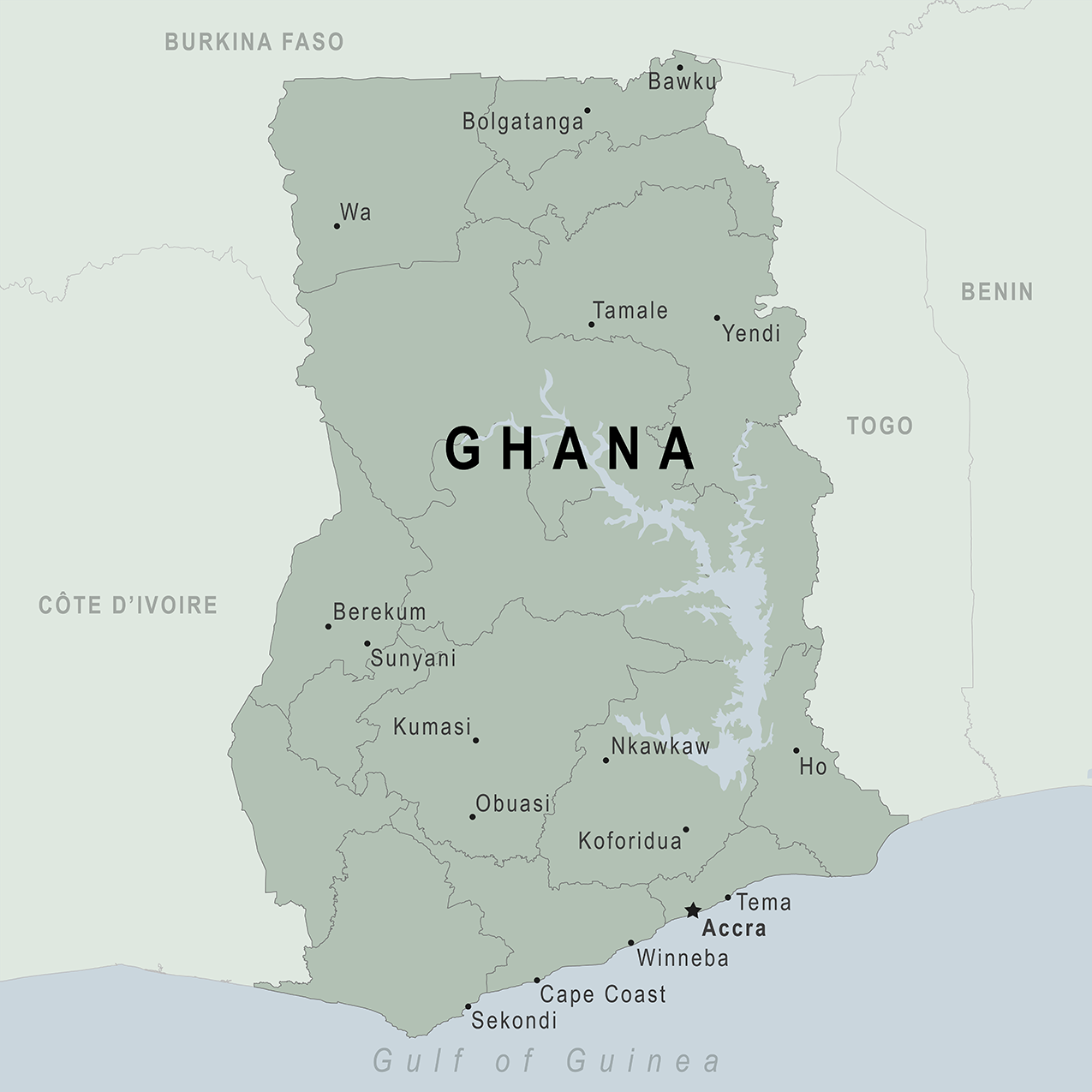
Ghana had a most extraordinarily rich soil and a climate which was conducive to abundant growth. It has a wide range of natural resources, from cocoa and timber to gold and aluminium. For a variety of reasons, had had been left idle or even allowed to disintegrate for some. The landscape consisted mainly of plains and low plateaus covered by rain forests in the west and the world’s largest Lake Volta in the east.
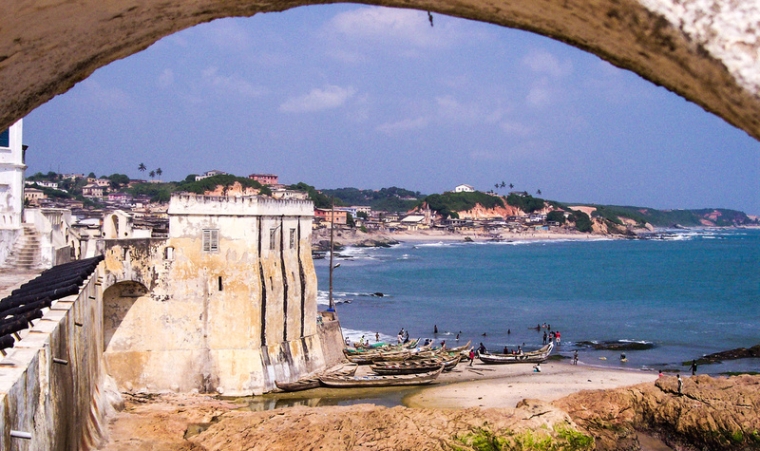
History
Most of what is now Ghana was inhabited in the Middle Ages and the Age of Discovery by different ethnic groups.
Ghana's first contact with the outside world was in 1471 with Portuguese traders when they landed on the west coast of Africa and noticed the local people in an area wearing gold jewellery. They then established the Portuguese Gold Coast (Costa do Ouro), to exploit the extensive availability of gold.
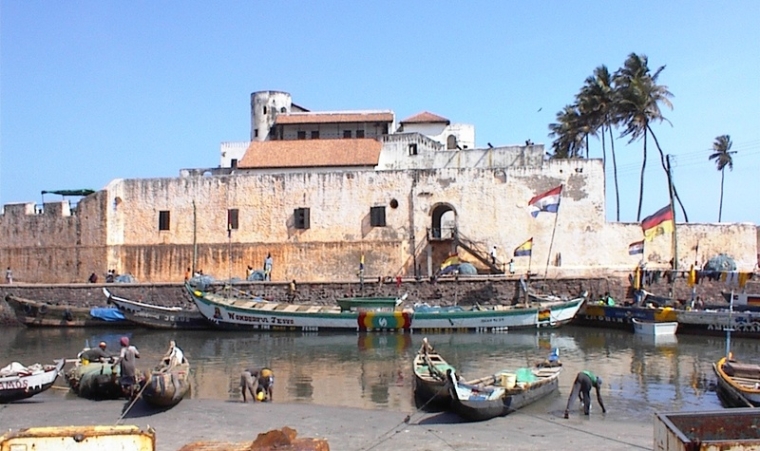
.jpg)
Other European traders soon came to Ghana in search for gold and joined in gold trading by the mid-17th century, and Ghana was known as the Gold Coast. Many castles and forts were built along Ghana’s 300 miles of coastline to serve as fortified trading posts. These were also used to hold slaves.
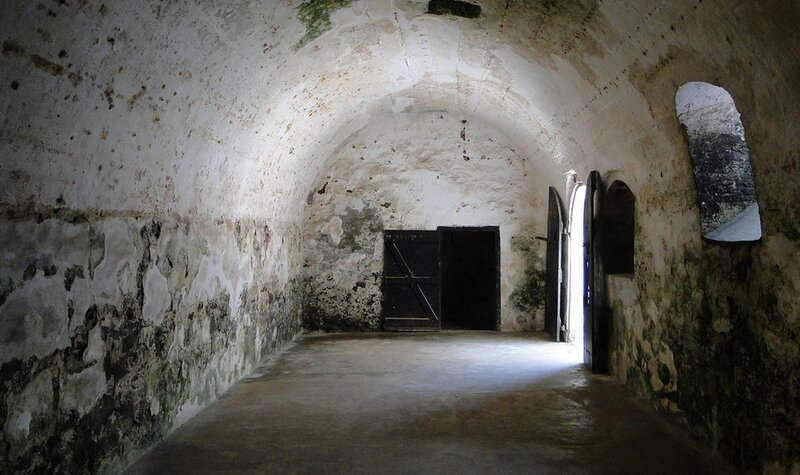
As early as 1500 the European traders were also involved in the transportation of captured African people, mainly to the Americas. In fact, for almost 150 years, Ghana, was the centre of the British slave trade. European traders arrived in ships loaded with manufactured goods to barter or trade for slaves.
The British eventually took control of the areas in the 20th century and declared the entire Gold Coast a colony of the British Empire.

In 1949 Dr Kawame Nkrumah, a Ghanian nationalist, formed the Conventional People’s Party and demanded self-rule. The party initiated a "positive action" campaign involving non-violent protests, strikes and non-cooperation with the British authorities.
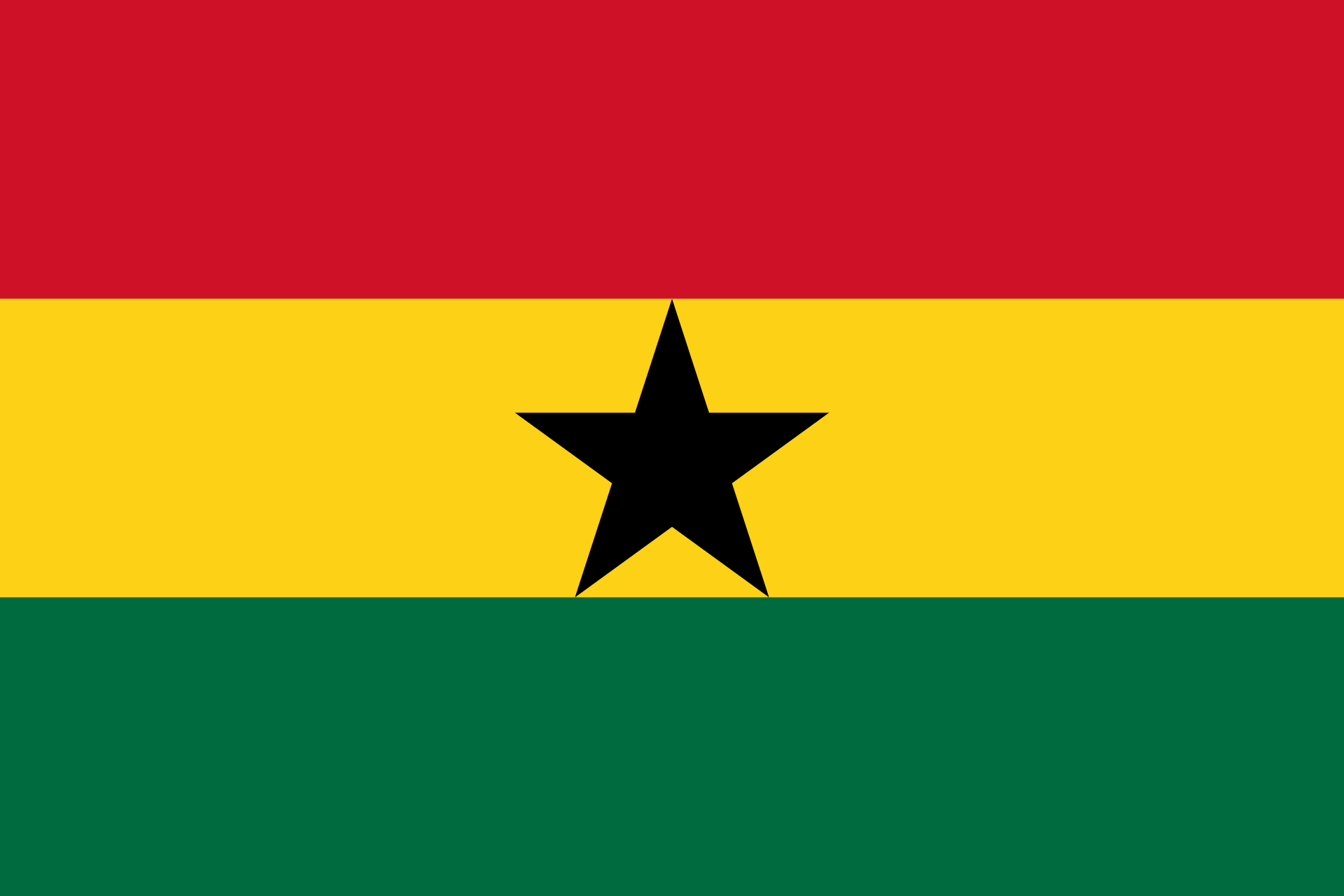 In 1957, the Gold Coast gained its independence from Britain and became known as Ghana.
In 1957, the Gold Coast gained its independence from Britain and became known as Ghana.
Endowed with gold and oil palms and situated between the trans-Saharan trade routes and the African coastline visited by successive European traders, the area known today as Ghana had been involved in all phases of Africa's economic development for thousands of years.
Population and language
The population of Ghana was around 10.2 million in 1976 when BCCI established a presence in Ghana.
Ghana was a highly multilingual developing nation in West Africa.
English was the official language of Ghana. Additionally, there were eleven languages that had the status of government-sponsored languages: Of these, Asante Twi, also known as Asante or Ashanti, was the most widely spoken.
Economy
When Ghana gained its independence from Britain in 1957, the economy appeared stable and prosperous. Ghana was the world's leading producer of cocoa, boasted a well-developed infrastructure to service trade, and enjoyed a relatively advanced education system.
The government began moving Ghana from a primarily agricultural economy to a mixed agricultural industrial one. The promotion of Ghana's foreign trade had been central to all government plans to revive the economy since 1983.
Ghana’s main mineral resources were bauxite, gold, diamonds, manganese, and the main industries: mining, timber processing, aluminium, light manufacturing, fishing, and processing of agricultural products.
Ghana’s main crops were cocoa, palm, root crops, maize, sorghum, millet, peanuts, and timber.
The major share of Ghana’s exports was high-quality cocoa. In lesser quantities, wood, gold, diamonds, manganese, bauxite and aluminium. The main imports: manufactured goods, foodstuffs, fuels, and transport equipment.
In addition, Ghana had oil and gas reserves for their own consumption.
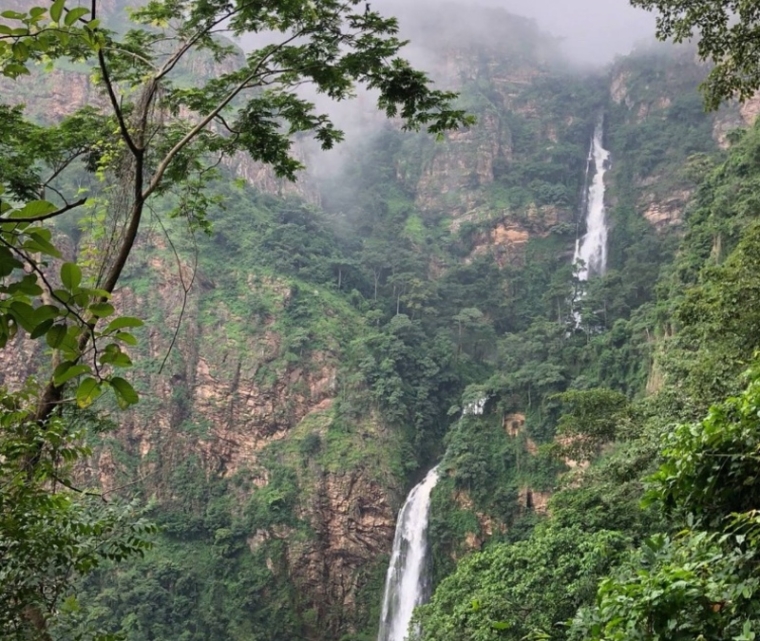
Tourism also generates foreign exchange revenue for the country. The major tourist attractions were the diverse wildlife, waterfalls such as the largest waterfall in west Africa, Wli waterfalls, the coastal palm-lined sandy beaches, caves, mountains, rivers, and reservoirs and lakes and old castles.
BCCI in Ghana
BCCI made a hesitant but sincere attempt to establish operations in Ghana in 1975 and 1976, but without much success. Mr Masihur Rahman, BCC Group chief financial officer, felt Ghana was a typical 'case study' of a Third World country with all the right ingredients and yet the wrong results.
"One day Ghana and its people would find the means by which they could play a part in feeding Africa as a whole and evolving a thriving economy for themselves". It was with this vision that BCCI finally established its presence in 1977 in the form of a 45% interest in setting up a new merchant bank Premier Bank Limited with BCCI responsible for the management, Banking operations and business capital.
From 1 January 1985, Premier Bank was restructured and renamed Bank of Credit and Commerce (Ghana) Limited (BCC Ghana). BCCI increased its shareholding to 60%.
With the management and careful nurturing of Mr Masihur Rahman, Mr P. F. Gutta, senior executive at central office and former Chairman and Managing Director of Union Bank of India and Central Bank of India, and Mr S. F. Ujjainwala, country manager, BCCI’s activities in Ghana were energised along with beginning of the long-awaited resurrection of the country’s economy.
Bank of Credit and Commerce Ghana branch was located at:
105 Graphic Road
PO Box 11011
ACCRA
Tele: 20788
Telex: 2192 VOLINES
Under the name of Premier Bank, BCCI's name and international role in the Third World were already well known in the country.
With a staff of 44 people, among them a few senior Ghanaian officers provided with international skills at BCCI regional training centres, the contribution of BCCI was acknowledged in a letter of the Central Bank of Ghana: "I am directed to inform you that your impressive performance during the year ended December 31, 1984, has been noted by us. The increase of your total resources by ₵185 million, or 304%, from ₵61 million in 1983 to ₵246 million in 1984, is a remarkable achievement. ... It is also hoped that you will contribute towards the Economic Recovery Programme by channelling some of your increased resources into the productive sectors of the economy .... ''
BCC Ghana along with five other commercial banks, including Ghana Commercial Bank (GCB), Standard Chartered Bank of Ghana (SCB), Barclays Bank of Ghana (Barclays), Social Security Bank (SSB) and National Savings and Credit Bank (NSCB), were reported to have over 80 percent of the total assets and deposits in the financial system in Ghana. (REPORT AND RECOMMENDATION OF THE PRESIDENT OF THE INTERNATIONAL DEVELOPMENT ASSOCIATION TO THE EXECUTIVE DIRECTORS ON A PROPOSED CREDIT OF SDR 74.0 MILLION TO THE REPUBLIC OF GHANA FOR A SECOND FINANCIAL SECTOR ADJUSTMENT PROGRAM November 15, 1991: A World Bank Document)
_0.jpg)
Working towards becoming one of the biggest banks in Ghana
"BCC Ghana has already established an international dimension," said Mr Ujjainwala in 1985. "We have considerable hope and courage with which to handle all business opportunities in the country, both large and small. But BCC's unique worldwide structure is now attracting the highest quality of international business in Ghana. The local business profile is diverse, and we are being supported not only by local Ghanaians with international business interests, but by the ethnic groups operating successfully in a free economy.
"The well-known association of some major companies with BCC has made a substantial impact and, as a result, our deposit base has broadened considerably. The Price Stabilization Fund, set up by the oil companies BP, Shell, Texaco and Mobil, amongst others, also associated itself with us. Confidence in Ghana is growing again."
"Within the branch all members of staff are contributing to our marketing programme. But, more surprisingly, our customers are also marketing for us. Our new energy and success come not only from our staff and our customers. The whole market is now giving us support.
"It would be unfair of me not to mention the important role that South magazine (a publication of the Third World Foundation) has played in giving us a distinctive character in this country. South magazine has done a lot for us in emphasising the strong Third World banking aspect of our group and in highlighting the fact that we are not a bank with only one country to cater for, but are involved with the world as a whole. This aspect is very much appreciated here. I feel happy to see its latest issue as a must in the waiting room of the Central Bank.”
"It is our collective hope and vision to become one of the biggest banks in Ghana, and this is not a foolhardy statement. Other banks have grown by 30% - 40% in the past year; we have progressed 15-fold in terms of deposits, assets and profits. Our capital base, which was ₵2 million at the end of 1983, now exceeds ₵10 million and our expectation is that our capital base will rise to ₵50 million before long, if only to sustain a rapidly growing deposit base and a manifold increase in business. This will allow us actively to participate in Ghana's all-round revival. The shelves in the stores are now almost full again, for the first time in five years. Production is increasing and exports are on the rise.
"We are now concentrating on non-traditional exports. There are many new lines. The established banks do not have the time to study or become involved in the non-traditional sector, due to their established relationship and rather easy success in the good days. Underlying all of these changes taking place in Ghana is the top priority the agricultural sector, which is now being supported by the whole of the banking industry, as requested by the government. Nature, too, is playing a part. The rains have been good for the past two years and the country is beginning to flower again."
Visit of Mr Jimmy Carter, former US President
On 1 August 1989, Mr Jimmy Carter, former US President, his wife Rosalynn Carter and his Global 2000 entourage, accompanied by Mr Swaleh Naqvi, BCC Chief Executive Officer, visited Ghana.
They had just attended a conference held in Lagos, Nigeria to promote a Global 2000 programme aimed at promoting to eradicate guinea worm disease by 1995.
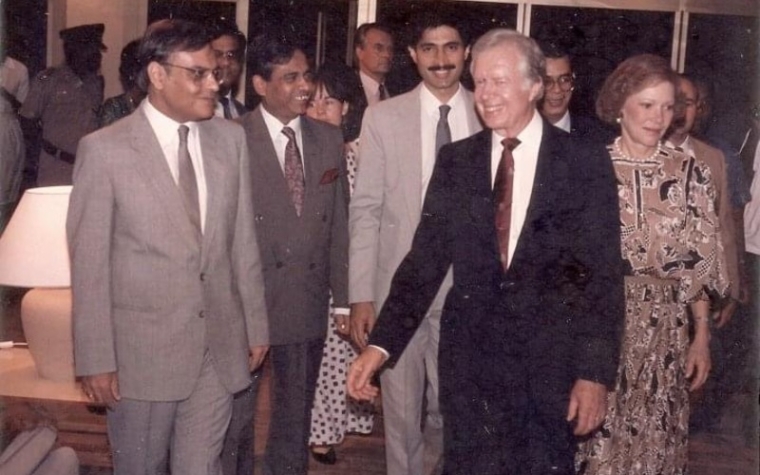
Global 2000 was one of the results of Mr Carter's sense of obligation, once he had left the White House in 1980, to use the knowledge, influence and experience he had gained in office to continue the search for solutions to problems on his agenda. These included the issues of education, hunger, health, the environment, human rights, conflict resolution and arms control.
The chairman of Global 2000 was Mr Carter. One of the two co-chairman was BCC President Mr Agha Hasan Abedi who strongly supported the programmes with funding and resources, and the other chairman was Mr Ryoichi Sasakawa of Japan, whose commitment to philanthropy was based on his deep yearning for world peace.
Financial Highlights 1989
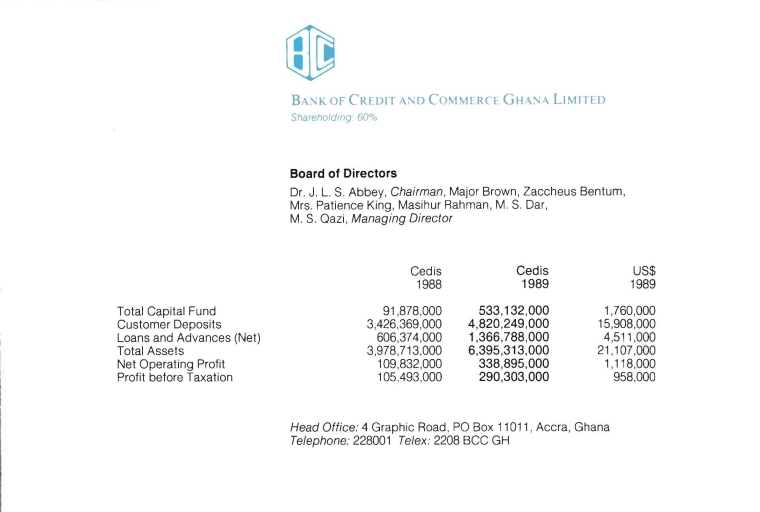
BCCI closure
On 5 July 1991 the Bank of England and other regulators in the west decided to freeze BCCI Group's assets and abruptly shut down BCCI's operations worldwide.
The priority of the governments and central banks in some countries was to protect their people and the local operations of BCCI continued in a different name after the assets and liabilities were acquired by private investors or another bank.
BCC Ghana was placed under the supervision of the (Central) Bank of Ghana (BOG). The Central Bank wished to see BCC Ghana continue its operations through a fresh injection of capital and restructuring possibly to include public subscription.
Following the decision of western central banks to shut down BCCI in 1991, the Bank of Credit and Commerce Ghana was being managed under BOG supervision since then. (THE IMPACT OF FINANCIAL SECTOR POLICIES ON BANKING IN GHANA by Martin Brownbridge and Augustine Fritz Gockel). Mr Asad Rauf Siddiqi, Managing Dircetor BCC Ghana was appointed by Bank of Ghana (central bank) to the caretaker Managing Director role. No further information is available.
The BCCI Group majority shareholders considered the abrupt action by western central banks to shut down BCCI in 1991 was unjustified when they already had detailed discussions with the Bank of England and other regulators on a restructuring plan and would have injected further capital, if required.
In a 24-page report not made public but sent to some 60 central bankers worldwide, the United Nations Center on Transnational Corporations said that by simply shutting down the 70-nation banking network that financed international trade of $18 billion a year, the economic damage fell hard-est on countries like Nigeria, Bangladesh and Zambia, where B.C.C.I. was an important institution. (New York Times, Feb 5, 1992)
